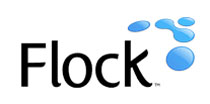Flock browser support ends April 26
 On April 26, 2011, support for the Flock browser will be permanently discontinued. On this day, all key functions will stop working, including native sharing of content with social networks, Gmail, Flickr, Delicious and Twitter. The announcement of this is published on the official website. Users are encouraged to export feeds, bookmarks and switch to Chrome or Firefox in the coming weeks.
On April 26, 2011, support for the Flock browser will be permanently discontinued. On this day, all key functions will stop working, including native sharing of content with social networks, Gmail, Flickr, Delicious and Twitter. The announcement of this is published on the official website. Users are encouraged to export feeds, bookmarks and switch to Chrome or Firefox in the coming weeks.The reason for the closure of the project was that in January 2011, the Flock development team went to work at Zynga . Unfortunately, many then thought that Zynga bought the browser and will develop it, but in reality they needed only people for their own projects (multiplayer games).
The Flock browser appeared in 2005, and the public beta came out almost simultaneously with the opening of Habrahabr in June 2006. Immediately he received very flattering reviews : “the most functional and modern browser of all existing. This is a program for the new generation of Internet users. In a sense, he personifies what browser developers should strive for. ”
It really was the most innovative browser, which in 2007-2008 collected many awards. Flock reached its peak in early 2008, when AOL stopped supporting Netscape and offered Firefox and Flock as the recommended browser (for Netscape 8, only Flock). In just two months, the distribution downloaded 3 million people and the number of active users increased 2.35 times. But soon interest in the browser began to decline. Until July 2010, Flock was based on the Gecko engine, after which it switched to WebKit in a highly modified form, which also scared many users away.
')
During its existence, the startup has raised $ 30 million in venture capital investments, including $ 15 million in the fourth round of funding in May 2008.
After the disappearance of Flock in this niche, there is only one “social browser” RockMelt . Thanks to the support of Mark Andressen (the same, co-author of the world's first graphical browser), his fate may be happier. RockMelt is also based on Chromium and in many respects similar to Flock, it is strange that it was not offered as an alternative to users of a dying browser. Maybe because it exists only under Windows and Mac.
By the way, in December 2010, RockMelt became one of the most popular hashtags on Twitter.
Source: https://habr.com/ru/post/117378/
All Articles